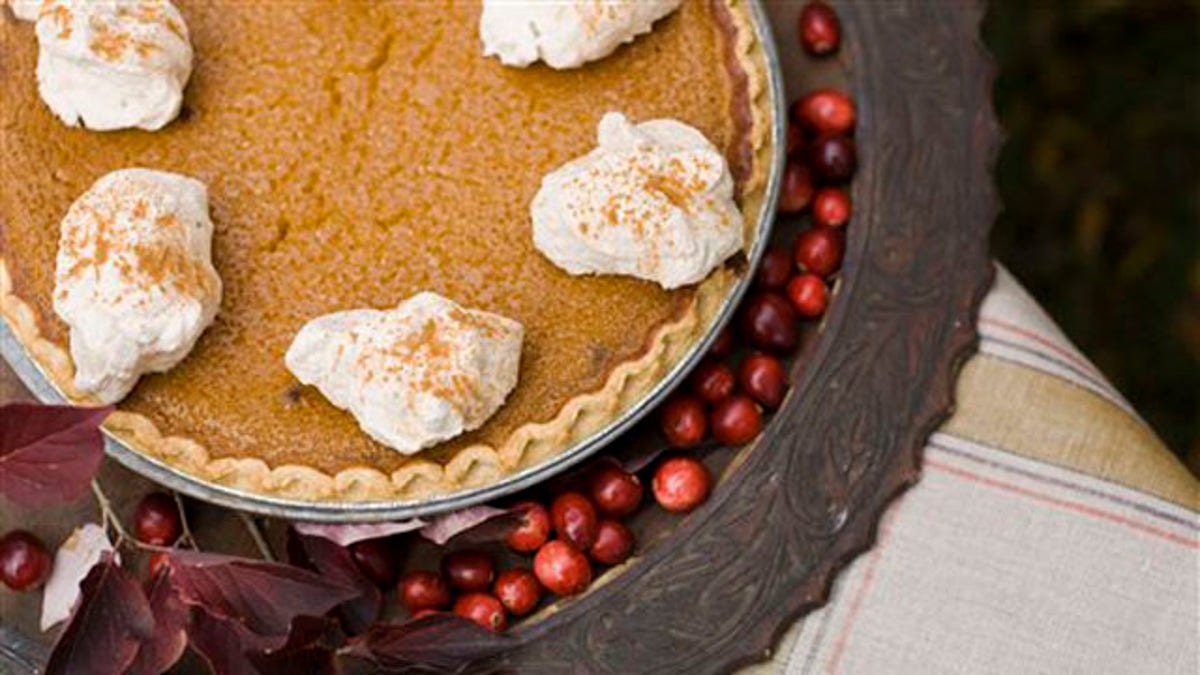
In this image taken on Oct. 8, 2012, a maple pumpkin pie with cinnamon-maple whipped cream is shown in Concord, N.H. (AP Photo/Matthew Mead) (AP)
Curbing your sugar intake at holiday time is about as easy as staying dry in a thunderstorm. Baked goods and sweet treats abound at the office, friends and family are gifting you chocolates left and right, and even your grandmother’s whipped yams call for two cups of brown sugar, without which they just don’t taste the same. Given sugar’s pervasiveness between Thanksgiving and New Year’s, trying to nix it can seem futile, or worse, downright cruel. Everyone else is indulging, so why should you deprive yourself?
And what’s the harm in a few slices of pumpkin pie and some eggnog to celebrate the season? Will it really kill you?
Well, research shows that, over time, it actually might. You won’t fall ill from one holiday indulgence, of course, but the problem is that sugar has addictive properties—and what begins as an innocent treat can easily morph into a daily sugar fix. When you eat a sugary food, a flood of dopamine is released in your brain. That dopamine creates an increased sugar tolerance, requiring you to eat more to get that same feeling of pleasure.
Most of us know that consuming too much sugar regularly is directly linked to diseases like obesity and diabetes. But what you may not know is that it’s also been linked to cancer, and even degenerative brain diseases such as Alzheimer’s—what scientists are now calling “type 3 diabetes,” or a form of diet-induced diabetes.
A recent study published in the journal Neurology showed that higher levels of blood glucose were associated with memory impairments, as well as a smaller hippocampus and compromised hippocampal structure— even in non-diabetic people. The hippocampus is the part of the brain responsible for memory formation. And, circling back to the cancer connection, a 2010 study published in the journal Cancer Research found that cancer cells feed on fructose to proliferate. Fructose is the type of sugar found in soda and even packaged breads and other baked products. Scary!
To keep your blood sugar levels on an even keel over the holidays, lower your risk of chronic disease, and boost your brain health, follow these guidelines that I share with my patients. I follow these tips myself all year round, with only the occasional slip-up at holiday time.
Know sugar’s code names. Beware of “health halos” when you’re shopping for holiday desserts—just because a food is organic or labeled natural doesn’t mean it’s healthy. Sugar is sugar, period. Common code names for sugar that people often wrongly associate with being “healthy” are agave nectar, brown rice syrup, cane sugar, evaporated cane juice, palm sugar, and any ingredient that ends in “-ose.” Even honey and maple syrup are recognized by your body as sugars. Knowing sugar’s code names will help you get a more accurate picture of how much you’re consuming.
Watch out for simple carbs. It’s not just the obviously sweet stuff that raises blood glucose levels. Simple carbohydrates of all kinds flood your blood with sugar— so your Mom’s dinner biscuits are just as much of a problem as the sugar bombs at the dessert table. High blood sugar creates a vicious cycle, making you crave more sugar, which is why an hour after a high-carb meal, you’re easily lured to that pile of gingerbread cookies. And don’t be tricked by the marketing of “whole grain” products; they spike blood sugar almost the same as white bread and table sugar. Resist sugar cravings by staying satiated with lean proteins such as chicken or fish and complex carbs such as green leafy, cruciferous, and root veggies.
If you’re going to indulge, do it intentionally. The fact is, all of us will be tempted to slice generously over the holidays, and it’s okay to give ourselves some leeway for our favorite desserts. Figure out exactly what you want to indulge in and commit to having just one or two servings of that food—and then drop your fork! It’s also helpful to pick a few days during the season when you know you’ll be extra tempted by holiday goodies, and set them aside as days to splurge. Remember, Thanksgiving and Christmas are only two days of the year, and the holiday season shouldn’t be an excuse to overload on sugar until January. Plan out your splurge days, keep portions small, and you’ll be supporting your brain health!
